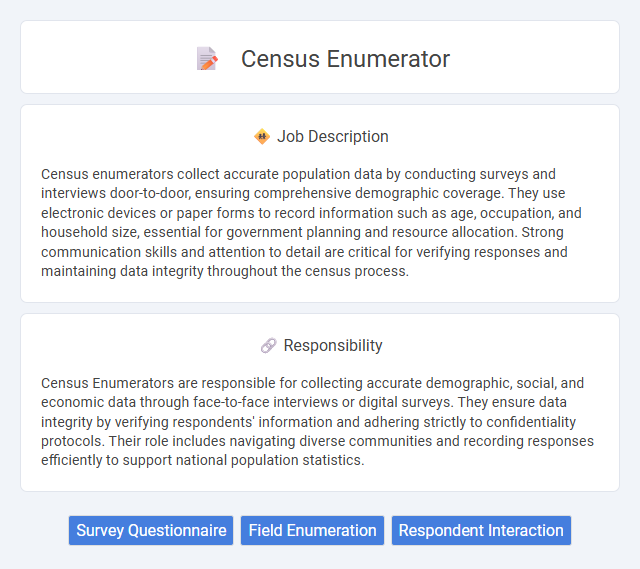
Census enumerators collect accurate population data by conducting surveys and interviews door-to-door, ensuring comprehensive demographic coverage. They use electronic devices or paper forms to record information such as age, occupation, and household size, essential for government planning and resource allocation. Strong communication skills and attention to detail are critical for verifying responses and maintaining data integrity throughout the census process.
Individuals who are detail-oriented and comfortable engaging with diverse populations may find the role of a Census Enumerator suitable, as it involves collecting accurate demographic data from households. Those with patience and strong communication skills are likely to perform well, given the need to explain questions and ensure respondents' understanding. However, candidates who prefer sedentary work or have difficulty handling repetitive tasks might face challenges in this position.
Qualification
Census Enumerators must possess strong communication skills and attention to detail to accurately collect demographic data from households. A high school diploma or equivalent is typically required, along with adequate training in survey methods and data recording techniques. Proficiency in using digital devices and the ability to work independently in diverse communities are critical for successful census data collection.
Responsibility
Census Enumerators are responsible for collecting accurate demographic, social, and economic data through face-to-face interviews or digital surveys. They ensure data integrity by verifying respondents' information and adhering strictly to confidentiality protocols. Their role includes navigating diverse communities and recording responses efficiently to support national population statistics.
Benefit
Census Enumerator positions likely offer valuable opportunities for skill development in data collection and interpersonal communication. These roles probably provide flexible schedules and short-term employment, appealing to individuals seeking temporary work. Engaging in census activities may enhance understanding of community demographics and support career growth in social research or government sectors.
Challenge
The Census Enumerator role likely presents challenges such as engaging with diverse populations who may be reluctant to share information, requiring strong communication and interpersonal skills. Navigating various geographic areas and weather conditions could prove demanding, potentially impacting data collection accuracy and efficiency. The probability of encountering incomplete or inconsistent responses may necessitate adaptive problem-solving and persistent follow-up strategies.
Career Advancement
Census Enumerator roles offer valuable experience in data collection, fieldwork, and demographic analysis, creating a strong foundation for career progression in statistics, public policy, and social research fields. Mastery in survey methodologies and GIS mapping during enumeration can lead to advanced positions such as Survey Supervisor, Data Analyst, or Demographer. These roles provide opportunities to influence policy decisions, work with government agencies, and engage in large-scale research projects, enhancing professional growth and specialization.
Key Terms
Survey Questionnaire
A Census Enumerator is responsible for accurately collecting data by administering detailed survey questionnaires to households and individuals. The role involves interpreting and clarifying survey questions to ensure respondents provide precise and comprehensive information, which is crucial for demographic and socio-economic analysis. Proficiency in handling diverse questionnaire formats and maintaining confidentiality of responses directly impacts the quality and reliability of census data.
Field Enumeration
Census Enumerators play a critical role in field enumeration by collecting accurate demographic data through direct visits to households. They gather essential information on population size, housing conditions, and socio-economic status, ensuring comprehensive and reliable census results. Proficiency in data recording, communication skills, and adherence to confidentiality protocols are vital for effective field enumeration during census operations.
Respondent Interaction
Census Enumerators engage directly with respondents to collect accurate and comprehensive demographic data through face-to-face interviews or digital surveys. They employ effective communication skills to build trust, clarify questions, and address concerns, ensuring high response rates and data reliability. Maintaining confidentiality and cultural sensitivity is critical during interactions to encourage cooperation and gather precise information.
 kuljobs.com
kuljobs.com